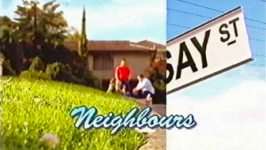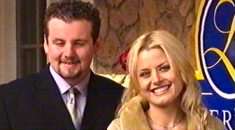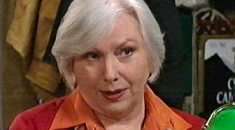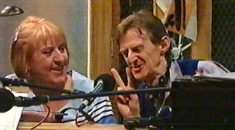|
.
Interviews
> Ric Pellizzeri
Riccardo
Pellizzeri is a relative newcomer to Neighbours,
having taken over the role of executive producer, following
the resignation of Stanley Walsh in November 2002. Ric's name
will be familiar to long-term fans of the show, however, as
he directed a number of episodes in the 1980s. Here, he talks
exclusively about his new position in charge of the Neighbours
phenomenon...
|

|
Can
you tell us a little about how you started in the industry?
Was it always your intention to work in television production
and direction?
I initially wanted to be a theatre director. I started directing
in university theatre and then directed both as an amateur
and professional in Sydney before going overseas. I was 28
years old and had just returned from the UK. I had been living
in England and had worked at the Bristol Old Vic, the London
Old Vic and in the West End as a stage manager. After returning
to Sydney I ended up working as a staging assistant at the
Australian Broadcasting Corporation. I just happened to be,
as the cliché states "in the right place at the
right time'. So in just two years I became a television drama
director and since then have directed over 100 hours and produced
over 300 hours of drama.
How
does the role of an executive producer differ from that of
producer?
The producer is the individual who has the responsibility
for the day-to-day operation of the production. They work
exclusively on the one show. The executive producer has a
far broader responsibility. In
my case I am responsible for Neighbours as well as
other drama projects. Also the executive producer is more
hands-off. This should allow you to have a broader overview
of what is happening in the production. Sometimes when you
are immersed in a production it is difficult to think more
expansively because you are focused on just getting finished
the things that need to be done. A good EP should be able
to look at a production more expansively and rather than worry
about the daily routine of the show ask questions that no
one else has the time or energy to ask. Questions such as:
Are we making the 'right' show? Are we telling the best stories?
Is this the best way to do things or are there other ways
and should we try them? Is this the right person for the job?
Is there something we are missing? Are we spending our money
on the right things?
Having
worked on other Australian dramas, also successful in the
UK, how does Neighbours compare? Is there a standard
to maintain - perhaps even to beat - when comparing it with
other similar shows? What is its mission statement and place
in the television market?
Every drama has its own fingerprint. You try to explore and
exploit a show's originality and distinctiveness. I don't
see it as a comparative exercise. There are many things that
Neighbours does in its own individual way. The characters
it deals with, the focus of its drama and humour, the suburban
world in which the stories are told. After 17 years there
is a very well defined Neighbours world, you have many
years of precedent to draw on and you have to take note of
the past to create the future. I
am lucky to have a group of people working on Neighbours
that between them know the history of the show intimately.
As all the Neighbours fans would know, it is a very
complex world connecting hundreds of characters. I rely on
and trust the story team's knowledge because they are also
fans and want to protect the show as much as anyone else.
I have discovered that the enthusiasm and dedication of the
Neighbours writing team and writers would be the envy
of many other shows. You try to make the best show you can.
I had an acting teacher once who used to say that you can
score a symphony with three notes - they just better be three
bloody good notes! To continue the music metaphor, we might
not have the resources of a symphony orchestra, but we try
to play the best notes possible. Like all drama our philosophy
is very simple. Robert McKee puts it very succinctly - 'Good
stories well told'.
Neighbours
has been a very successful show and has generated a family
of soaps all around the world. FremantleMedia makes serial
drama in Germany, Italy, the UK, Poland, Hungary, Romania
and so on and they all owe their genesis to Neighbours
and other Grundy productions such as Prisoner and
Sons and Daughters. In television history it is an important
production because the success it had in Australia paved the
way for all these other European dramas. My
'mission statement' for Neighbours was circulated to
the story team and the writers at the beginning of this year
- 2003. It looked at the Neighbours philosophy - for
want of a better term: family, intergenerational conflict,
relationships, level of truth, ethics and morality, aspirational
qualities, personal and public issues, humour, culture and
language. We also did an analysis of story structure and all
our characters. This is the blueprint of the show, a little
like the schematic plans of a car and its engine - the engineers
and the designers need to have one, but all the public needs
to see is a beautiful vehicle that does everything it promises.
So what we want to continue to create is a good show that
gives pleasure, satisfaction and touches our audience.
|

|
MDA
is another accomplished drama attached to your name. How difficult
was the transition from that to Neighbours? Is it feasible
we may see some of the more dramatic elements of MDA
being implemented in Neighbours? The exit of Dee Bliss has
been reported as being the most dramatic yet. Was this a deliberate
"moving up a gear"?
MDA
was and is a very different show. One of its central tenets
is ambivalence. It is a very issue driven show that was created
exclusively for an adult audience. Neighbours is a
very different drama. In Australia it has a G rating and that
very much shapes the story content. Using the musical analogy,
it plays different notes; it doesn't mean that those notes
are any less valid or important. It is the same with television
programs. They are all different and appeal to different people.
I
have deliberately tried to up the stakes on Neighbours
and you will be seeing the results of this during the winter
of 2003. This was done for a variety of reasons that are too
long-winded to go into and we have to keep some secrets. You
need to up the ante every now and then and see how it works
and a number of opportunities with cast changes presented
themselves to be able to do this. The story team have enthusiastically
embraced this and they are creating some wonderful material.
Dee's exit gave us an opportunity that comes along in particularly
rare circumstances, so we took advantage of it. It is very
moving television and the work done by particular members
of the cast is extraordinary.
What
do you make of the statement by former script producer, Barbara
Angell, that "The weakness of Neighbours now
lies in its failure to appeal to a wide enough audience. It
aims too narrowly at the teeny bopper market. If it would
widen its horizons, a much broader range of stories could
once again be tackled"?
I don't disagree with Barbara Angell's observation. I did
a little research into the history of the show and I am trying
to reinforce certain elements that have possibly not been
centre stage for a while. I think that inter-generational
stories are a very important part of Neighbours storytelling.
We have broadened the range of stories this year and with
the introduction of new characters and a new family you will
see the results of this towards the latter part of 2003 and
the beginning of 2004. I
have made this statement before but it is worth repeating.
I am trying to enrich what is there, not reinvent it or change
it, but build on the very solid foundations the show has laid
down over the years. Neighbours has had different foci
over the years but the premise has remained the same - the
lives and loves of a group of families living in a cul-de-sac
in middle-class Australia. I believe that all aspects of the
lives of these families need to be explored. The reach of
the stories will be broader.
You
joined Neighbours at a time of comparative great upheaval
- with the departure of Maggie Millar (Rosie Hoyland) during
one of your first few days on the show - as well as the recent
shock departures of Mark Raffety (Darcy Tyler), Madeleine
West (Dee Bliss) and Michelle Ang (Lori Lee). How difficult
was it to cope with these changes so early on?
At any stage Neighbours has about 17 to 24 main cast
members. You fall in love with certain characters and over
the years build close friendships with them so it is sad when
they move on. But change is inevitable and new characters
move in to take the place of the ones that have gone. The
exit of certain characters gives the story team the opportunity
to create stories they previously couldn't deal with by bringing
in new characters that can be the protagonists for these stories.
Neighbours has always had this factor in its make-up.
Characters have come and gone and will continue to do so for
the unforeseeable future of the show. I
don't see it as something that creates instability. Like in
real life, the changes should create interest and excitement
and take you to places that are fresh and thrilling. It is
an opportunity to explore new things and perhaps view the
old from a new and different perspective.
|

|
Do
you foresee an occasion where the character of Rosie Hoyland
may return, bearing in mind the phenomenal response to her
axing? How influential do you think fans are in swaying decision-making
in a programme like Neighbours?
The
audience is always important and you have to listen to the fans.
But the responsibility of making the program rests with us,
it is our job and we live or die by the decisions we make. You
keep all your options open, but at this stage Neighbours
has been launched in a certain direction and we need to
see how that goes before we make any other changes.
You
were quoted as saying that one of the biggest elements of
Neighbours you wanted to change was in terms of how
developed and individual the characters were. Do you feel
that strategy is easy enough to adopt with an already established
cast? How do you go about making such changes to the characters?
We have done a thorough review of all the characters in the
show and this has influenced the characters we are bringing
in and developing. We looked for the 'gaps' and have created
a number of characters to fill those gaps. Characters
on Neighbours tend to be quickly humanized and their
major flaws become quickly rectified or minimized. We have
gone back to the origin of some of our established characters
and re-introduced and reinforced those early flaws. Human
beings don't change that easily and neither should fictional
characters. There is a danger that everyone is too 'faultless'
so we are making sure that we can exploit the characters'
flaws as well as their strengths. We
needed to create antagonistic characters in a Neighbours
context and we have done this with our new characters.
They will create new and enduring conflicts and this is the
very substance of drama. It will enhance our storytelling.
|

|
It
has recently been announced that the character of Sky Bishop
is returning to Ramsay Street after more than ten years off
screen. Similarly, the Rebecchi family has also been back
for guest appearances. What lies behind the decision to bring
Neighbours' past back to the forefront? Can we expect
more "returnees" sometime soon? What does Neighbours'
past mean to you?
Sky
has been introduced to bring more conflict into Harold's life.
There are other elements we are introducing to turn Harold's
life upside-down. Sky is a good example of the characters
we are initiating to shake up some of the already established
characters. The re-introduction of the Rebecchi family was
appropriate to the storylines we were doing, so when we asked
if they were interested in returning for a short stint, they
luckily said yes. Like I said, you cannot ignore the past
and the show has always tried to keep its links with that
past. It isn't always possible to bring people back. Some
of them move on.
Are there any major changes planned in terms
of the show's character and nature? What would you most like
to see happen to Neighbours during your time on the
show?
Like they say in the classics "You'll just have to stay
tuned." We are certainly enjoying what we are making
at the moment, I can only hope and trust it will be the same
for our audience.
Interview
by Rhys. Added on 10th May 2003
Back
|

